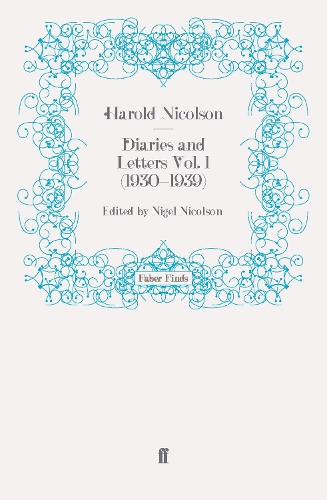
Diaries and Letters Vol. 1 (1930-1939)
(Paperback, Main)
Publishing Details
Diaries and Letters Vol. 1 (1930-1939)
By (Author) Harold Nicolson
Faber & Faber
Faber & Faber
19th March 2009
Main
United Kingdom
Classifications
General
Non Fiction
828.91203
Physical Properties
Paperback
462
Width 153mm, Height 234mm, Spine 33mm
690g
Description
Harold Nicolson's Diaries and Letters, spanning the years 1930 to 1962, were first published in three volumes, and it is in this format Faber Finds is reissuing them. The one-volume abridgement available in paperback from Phoenix is practical, and in itself a superb piece of compression, but such a great work, one of the major diaries of the twentieth-century, deserves also to be available in its full original incarnation. picture of English society in the 1930's, but a touching self-portrait of a highly intelligent and civilized man driven by conscience and curiosity to enter politics' Sir Kenneth Clark and serviceable to the historian.' Malcolm Muggeridge, Observer besides the diary proper, there are many letters to Sir Harold's wife, Vita Sackville-West, and not a few from her to him. But this remains solidly and brillinatly Sir Harold's own book.' Cyril Connolly, Sunday Times
Author Bio
Harold Nicolson (1886-1968) was a man of manifold talents: a diplomat, politician, journalist, broadcaster, historian, biographer, diarist, novelist, lecturer, literary critic, essayist and gardener. Perhaps most celebrated for his Diaries (reissued by Faber Finds in their original three volumes), they run the risk of obscuring the excellence of his other books. He wrote over thirty: Some People, Sir Arthur Nicolson, Peacemaking, 1919, Curzon, The Last Phase, 1919-1925, and The Congress of Vienna are all being reissued in Faber Finds. Harold Nicolson was educated at Wellington and at Balliol College, Oxford. He joined the Foreign Office in 1909, and in 1913 married the writer Vita Sackville-West. He was a member of the British delegation to the Versailles Peace Conference in 1919. He left the Foreign Office in 1929, and in 1935 he was elected National Labour Member of Parliament for West Leicester. In 1940 he was appointed a Junior Minister in Churchill's wartime government. In his eulogy, John Sparrow, with affectionate aptness, described Harold Nicolson as 'a nineteenth-century Whig leading an eighteenth-century existence in the twentieth-century.'
